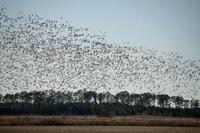ANNAPOLIS, Md. — The Maryland Department of Natural Resources (DNR) has expanded its partnership with the U.S. Department of Agriculture’s Animal and Plant Health Inspection Service to manage the growing threat of Highly Pathogenic Avian Influenza (HPAI) in wild birds across the state.
The contract expansion, valued at $30,000, will provide additional wildlife technicians to remove sick or dead waterfowl, raptors, and other birds that could spread the virus. This brings the total annual contract to $110,000 through September, enabling faster response times and more comprehensive coverage.
Laboratory tests earlier this month confirmed HPAI in seven dead snow geese found in Worcester and Dorchester counties. Bird flu has also spread in Delaware, canceling all poultry activities at Ag Week.
The virus, often referred to as "bird flu," has also been detected at multiple poultry farms on the Eastern Shore, prompting heightened biosecurity measures.
Avian influenza is considered endemic among Maryland’s wild bird populations, especially waterfowl and raptors. While the risk to human health remains low, the virus can spread quickly among birds, making proper disposal of dead wildlife a priority.
What to Do if You See Dead Birds
Locals are urged not to handle or move sick or dead birds. Instead, they should report sightings to USDA Wildlife Services at 1-877-463-6497 or 410-349-8055. Operators are available Monday through Friday, from 8 a.m. to 4:30 p.m., except on state holidays.
Hunting and Outdoor Precautions
Hunting wild birds remains safe, but experts advise hunters to follow biosecurity measures:
- Avoid harvesting or handling sick or dead birds.
- Wear gloves while handling game and double-bag waste.
- Wash hands and tools thoroughly after contact.
- Cook game meat to at least 165 degrees to eliminate pathogens.
Birdwatching, hiking, and photography near wild birds are also safe, but caution should be taken to avoid contact with dead or sick birds.
Protecting Domestic Poultry
The Maryland Department of Agriculture (MDA) has issued guidelines to protect poultry farms and backyard flocks:
- Restrict access to poultry enclosures.
- Use disinfectant footbaths and boot covers.
- Secure feed and dispose of waste to prevent access by wild birds or animals.
- Report any unusual poultry deaths to the MDA Animal Health Program at 410-841-5810 or the USDA at 866-536-7593.
Songbirds remain at low risk for spreading HPAI, so locals can safely maintain bird feeders during winter.
More information on avian influenza prevention and mitigation can be found on the U.S. Department of Agriculture’s website.







